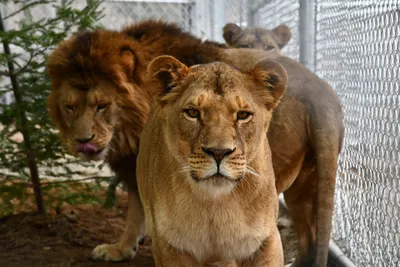Rescued lions from Quebec roadside zoo transported to sanctuary in the United States
Animal protection groups demand stronger federal legislation to protect wildlife in
captivity
Following a lifesaving lion rescue from a roadside zoo in Quebec, six lions
are leaving their temporary home where they have been cared for by Aspen Valley Wildlife Sanctuary in Ontario, to go to their permanent sanctuary destination at Turpentine Creek Wildlife Refuge in Arkansas, USA.
This critical rescue operation, which required the collaboration of Humane World for Animals Canada, formerly called Humane Society International/Canada, and multiple sanctuaries, along with significant resources, highlights the urgent need to reform Canada’s wildlife laws, including a federal ban on the captivity of non-domestic big cats, elephants and great apes for entertainment.
Humane World for Animals Canada facilitated the rescue of the lions, who were found at a closed roadside zoo confined in a small, barren, substandard shed with inadequate enrichment, veterinary care and nutrition and were exhibiting signs of severe stress.
This lion rescue follows the largest zoo animal seizure in Canadian history of more than 200 wild and exotic animals from a roadside zoo in St-Édouard-de-Maskinongé conducted by Humane World for Animals Canada and the Montreal SPCA in 2019.
Rebecca Aldworth, executive director of Humane World for Animals Canada said: “The story of these lions illustrates the urgent need for government action. In Canada, wild and exotic animals in captivity remain tragically under protected. The ongoing need for non-governmental organizations, including Humane World for Animals, to rescue the victims of roadside zoos highlights a glaring gap in federal policy. Without meaningful legislation, unethical facilities will continue to profit from animal suffering.
Canada now has a clear opportunity to bring federal animal welfare laws in line with public values—and to establish itself as a global leader in protecting captive wildlife.”
In recent months, the rescued lions were cared for at Aspen Valley Wildlife Sanctuary in Northern Ontario, where three state-of-the-art enclosures were built to temporarily house them. Weeks ago, three of the lions were transported to their final home at The Wildcat Sanctuary in Minnesota, USA.
Now the remaining lions will spend the rest of their lives at Turpentine Creek Wildlife Refuge. Tanya Smith, executive director of Turpentine Creek Wildlife Refuge, said: “We at Turpentine Creek are pleased to welcome the lions from Aspen Valley Wildlife Sanctuary. They will be moved to Eureka Springs, Arkansas, and enjoy a good life at true sanctuary. We are grateful to all who help during this noble endeavour. It’s been a hugely complex operation, but we made it together. The lions are safe.”
Linda Glimps, executive director of Aspen Valley Wildlife Sanctuary, said: “Having the opportunity to temporarily care for these lions was both deeply moving and heartbreaking. No wild animal should ever endure the conditions they came from. At Aspen Valley, we gave them safety and dignity for the first time in their lives. Their move to a permanent sanctuary marks a new beginning—and underscores the urgent need for stronger federal laws in Canada to ensure no animal suffers in captivity again.”
Tammy Thies, executive director of The Wildcat Sanctuary, said: “The lions rescued by The Wildcat Sanctuary in Minnesota are already living happily wild at heart in large free-roaming habitats, including lion cub Mango who was born during this rescue. This has been our 7th rescue trip to Canada, where we advocate for stricter regulations and more true sanctuaries so wild animals can be properly and humanely cared for there. We are proud to work alongside so many accredited sanctuaries and reputable organizations to get these lions to permanent sanctuary.”
In 2023, the former Liberal government made good on its mandate to better protect wildlife in captivity with the introduction of Bill S-15, An Act to amend the Criminal Code and the Wild Animal and Plant Protection and Regulation of International and Interprovincial Trade Act, which would have banned new captivity of great apes and elephants in Canada for use in entertainment. Lawmakers also recommended including big cats (lions, tigers, leopards, jaguars and cheetahs) in an official Senate report. Unfortunately, the bill died on the order paper with the recent federal election. Humane World for Animals Canada is urging the federal government to introduce legislation to ban captivity of big cats, elephants and great apes at the earliest opportunity.








